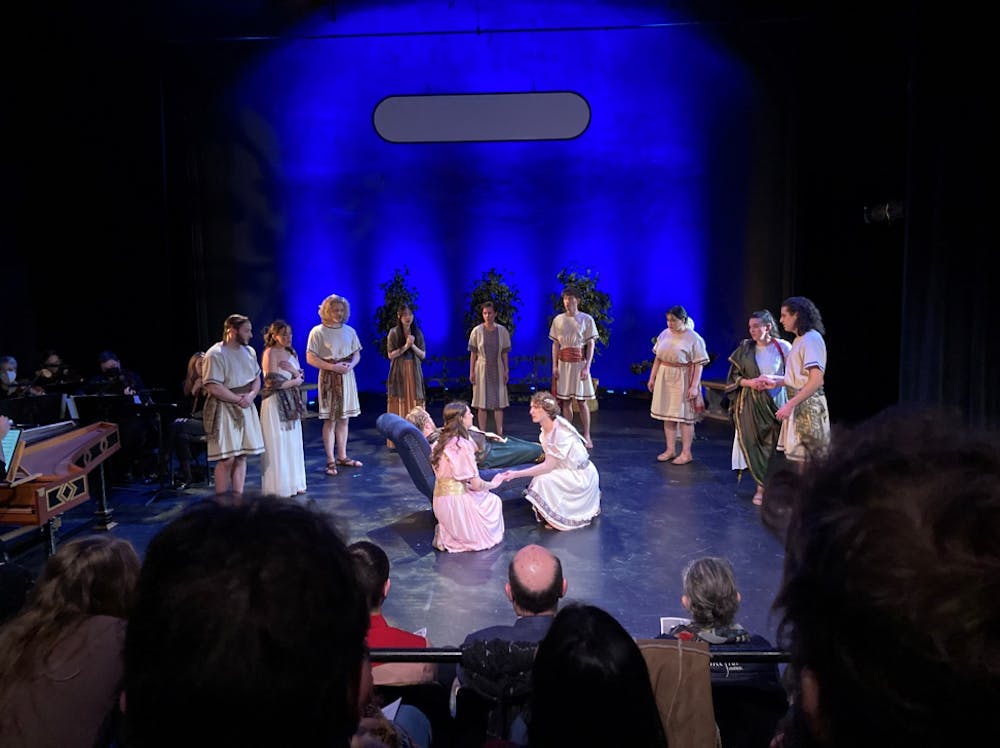The Peabody Opera Theatre put on a production of John Blow’s opera Venus and Adonis in conjunction with the Peabody Historical Performance Department on Feb. 17. The performance took place at Theatre Project, a small performing arts center located a 15-minute walk north of the Peabody Institute.
Venus and Adonis is often thought to be the oldest surviving English opera, originally composed circa 1683, but the students of the Peabody Opera Theatre have seamlessly brought it before the modern audience.
The story is based on the Greek myth of the titular Venus and Adonis, with Venus being the Roman goddess of love and beauty and Adonis her mortal lover. One day, Venus convinces her lover to go on a boar hunt. However, on this hunt, Adonis is tragically gored by the wild boar and returns only to die in Venus’ arms. As Venus cries over Adonis’ body, she creates the anemone flower.
The performance opened with three arias by Henry Purcell, a contemporary of Blow. The pieces performed were “Shake the cloud from off your brow,” “Pursue thy conquest love” and “Oft she visits this loved mountain” from Dido and Aeneas, another opera telling a classical story of tragic lovers. Each piece was stunningly performed by one of the three sopranos who played the roles of the Three Graces that evening: junior Ashley Huber, graduate student Kristen Sullivan and graduate student Grace Herron.
Then the story of Venus and Adonis began. What I didn’t expect was just how humorous and fun this opera was to watch. The story is timeless, in the way of many classical myths, and the musicians took real ownership of their roles. Their control of the sound of the music made me feel completely immersed in the emotions and world of the opera.
A particular delight throughout the opera was the performance of junior Bryce Zimmerman as Cupid. He confidently swaggered about the stage, impishly matchmaking and delighting in stirring up drama with Venus. There were several moments where his actions on stage incurred bouts of laughter from the audience.
Graduate students Lori Perko and TJ Callahan did wonderful jobs as the titular Venus and Adonis. The back and forth of their flirting and cajoling on stage was hugely enjoyable to watch, and their singing was beautiful. Adonis’ voice was warm and full of power, while Venus’ voice was clear and bright.
As I’ve come to expect from Peabody performances, I couldn’t tell the difference between the quality of the students in front of me and those I’ve heard in professional settings. Though I always come in with high expectations, they still manage to blow me away every time. Every one of the singers, from chorus to lead, sounded flawless.
In many solo moments, the musicians sang with a wonderful lightness in the quality of their voices, carrying a bright and pastoral feel. Yet, in the final act of the opera, as Adonis lay dying on the stage, Venus’ solos shook off that carefree lightness for a piercing, rich tone that portrayed all the colors of grief. The united sound of the chorus was wonderfully warm and full, a much-needed balm after the sudden tragic turn of the music and the story.
Additionally, the opera was accompanied by the Peabody Historical Performance Ensemble. They played baroque instruments, including the harpsichord, organ, baroque violin, baroque cello and recorder.
The whole performance was very short, only about one hour in total, but time flew. When Adonis came limping and bloodied onto the stage, I was surprised and sad to realize that the opera was about to reach its close. Throughout the performance, I was laughing, close to tears and utterly enraptured.
Even as someone who doesn’t listen to opera, I absolutely loved this performance. I felt genuinely invested in the story and characters the whole time, and I felt invited to listen to the nuances of emotion and drama in the music in a way that I’d never experienced before. Seeing the musicians perform on stage before me bringing new life to these old pieces and ancient stories was fantastic, and it made me want to attend more performances like this in the future.





